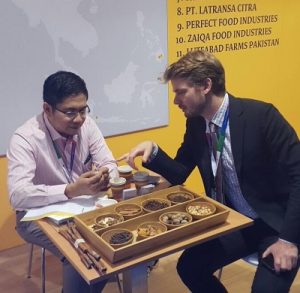On 16th of March 2016, Mercadero facilitated the annual peer group meeting on Spices and Herbs with the aim to gather up-to-date knowledge for market information, which will be published by the CBI later this year. During the meeting, business representatives, market researchers and representatives of sustainability initiatives discussed the latest trends and developments in this sector.
 Most spices are produced by smallholder farmers in developing countries, bringing along a number of challenges in this sector. First of all, ensuring quality and food safety remains an issue. Contamination with mineral oil, paralytical alkaloids and other contaminations still occur for various products from various countries. An increasing share of pepper exported by numerous producers from Vietnam contains pesticide residues and does not comply with EU regulations. Sector associations are addressing the problem and European buyers are searching for other import channels, establishing either their own production plants or direct relationships with suppliers. Contract farming and the use of company standards to ensure quality, safety and basic sustainability measures are seen as important tools for risk management, crucial in a sector that is mostly reliant on small farmers. Rudimentary cleaning and guaranteeing food safety are thus crucial for developing country producers to access the EU. Experts also agreed that there is an increasing need for transparency and traceability in the market. Due to these developments it is expected that a growing number of EU buyers will establish direct relationships with producers.
Most spices are produced by smallholder farmers in developing countries, bringing along a number of challenges in this sector. First of all, ensuring quality and food safety remains an issue. Contamination with mineral oil, paralytical alkaloids and other contaminations still occur for various products from various countries. An increasing share of pepper exported by numerous producers from Vietnam contains pesticide residues and does not comply with EU regulations. Sector associations are addressing the problem and European buyers are searching for other import channels, establishing either their own production plants or direct relationships with suppliers. Contract farming and the use of company standards to ensure quality, safety and basic sustainability measures are seen as important tools for risk management, crucial in a sector that is mostly reliant on small farmers. Rudimentary cleaning and guaranteeing food safety are thus crucial for developing country producers to access the EU. Experts also agreed that there is an increasing need for transparency and traceability in the market. Due to these developments it is expected that a growing number of EU buyers will establish direct relationships with producers.
Sustainability is an upcoming trend in this sector, although still in the development phase. Most European spice companies are using company standards as a tool to ensure sustainability, but the presence of consumer sustainability labels is still limited. Company standards often incorporate ILO guidelines for fair and safe working conditions, but may contain other criteria on Corporate Social Responsibility as well. The focus in these standards is often to prevent the greatest risks, such as child labour, minimum wage violations and dangerous working conditions. Certification costs are high, especially since most producers are small enterprises, and retailers and industrial customers are not yet willing to pay the premium price needed for certified spices. While this is slowing the development of sustainability in this sector, experts agreed that interest in sustainable spices is on the rise.
If you would like to know more about the latest trends and developments in Spices and Herbs, or if you have valuable expert knowledge on the sector that you would like to share, then please contact Mercadero.
